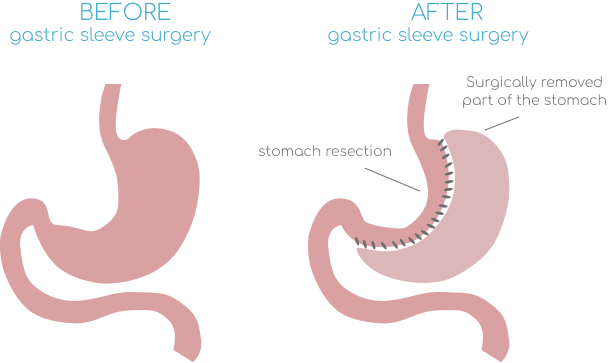Bariatric surgery is performed when diet and exercise do not work or when there are serious health problems due to being overweight. Some procedures limit how much you can eat. Other procedures work by reducing the body’s ability to absorb nutrients. Some procedures do both. Dr. Nerijus Kaselis will advise you on the most suitable procedure.
LAPAROSCOPIC GASTRIC SLEEVE SURGERY
Laparoscopic gastric sleeve surgery is an increasingly popular obesity related surgery throughout the world. The difficulty of this surgery is significantly smaller, and it can be carried out faster, however weight loss results are significant.
New medical studies show a positive effect in decreasing underlying medical conditions, such as type 2 diabetes, after a laparoscopic gastric sleeve surgery. Aditionally the decreased difficulty of the surgery leads to a lower risk of surgical complications arising. Long term results of the surgery – weight loss, and effect on underlying medical conditions.
Price: 5500€ / 4700£ read more about whats include the package
Compulsory BMI
Expected weight loss
Surgery duration
Time spent at hospital
Sick Leave
Need for supplements
from 30 kg/m2
60-70% excess body weight
0,5 – 1 hour
3 nights
2 – 3 weeks
Recommended long term use

Good weight loss results
Safe surgery
Less damage to the stomach
PURPOSE OF THE SURGERY
A surgery to cure obesity should only be chosen once the patient has tried diets and is sure that they will not help to achieve the desired result. In this case, a vertical stomach resection is chosen, during which a large part of the stomach is removed, dissecting it from top to bottom vertically.
The severed stomach is completely removed from the gastric cavity, usually the stomach size is decreased from 90% to 95%. After the surgery the stomach fills much faster, therefore the patient feels full, does not want to eat and weight decreases.
The purpose of the surgery is to decrease the stomach size. The smaller the size – the less food can fit, and less calories taken in.
The main difference between stomach resection surgery compared with gastric bypass is that the food anyway continues through the full digestion system, vitamins and minerals absorption is not affected. After surgery the stomach and intestine can be analysed by endoscopy, and that is important for patients who have certain stomach or gall system illnesses.
The result is – less food consumed, less weight gained and increased well-being. Laparoscopic gastric sleeve surgery is safe, fast and effective.
It is calculated that after the procedure
a person loses up to 60-70% of their body weight
EXCESS WEIGHT ISSUES/PROBLEMS
Sometimes excess weight leads to certain ailments or impedes recovery. If your body mass index is above 35, usually the joints begin to suffer due to the extra pressure from the weight, snoring appears, salts form, stones may appear on the gall. Additionally, excess weight increases the risk of hypertension, heart attack or even cancer, a lot of overweight people are affected by heart or blood vessel related diseases. In some cases, the surgical method can be the only one which can help the patient improve their health and condition.
This procedure is recommended for people whose body mass index is 30 or above, have diabetes, increased blood pressure, arthrosis or other health problems. It must be noted that, obesity can be due to three certain factors: poor diet and low levels of physical activity or endocrine disorders.
Stomach reduction surgery is a way to develop healthier lifestyle habits. Post-surgery the stomach decreases in size, and smaller amounts of food intake create the feeling of fullness. This allows patients to avoid over-eating or feeling hungry – meals are not too big.
Relatively quickly post-surgery, the issues associated with excess weight disappear (diabetes, hypertension, snoring and etc.) Therefore, this is a great surgery to change your life: to feel physically and emotionally healthier and more attractive.
Testimonials
WHO REQUIRES A STOMACH REDUCTION SURGERY?
The surgery is assigned by a medic, who upon analyzing the patients condition can identify the most appropriate treatment. Of course, dietary changes and physical activity are the first approach.
Unfortunately, due to excess weight, some individuals find physical activity very difficult to undertake. In those cases, gastric bypass surgery is the first treatment step, which is later accompanied by healthy lifestyle changes.
The surgery is recommended for people whose body mass index is above 30 (normal BMI is considered 18,5-24,9). Before the surgery the patients condition is evaluated.
In some cases, the patients condition does not allow for the surgery to go ahead, then other alternatives are considered. The effects of stomach reduction surgery will pleasantly surprise you!


ADVANTAGES OF STOMACH RESECTION SURGERY
- The main advantage of gastric sleeve surgery, is that unlike in gastric bypass surgeries, food still travels fully through all parts of the digestion system. Nutrient (including vitamins and minerals) absorption is not affected. After surgery , the stomach and duodenum can be evaluated endoscopically , and that is important for patients with certain stomach and gall illnesses.
- After stomach resection surgery, there is a noticable positive effect on underlying conditions such as, sleep apnea, type 2 diabetes, joint ailments, increased bloodpressure or polycystic ovary syndrome (PCOS).
- Stomach resection surgery is less damaging to internal organs, therefore is more recommended to people of an older age or women who plan for pregnancies.
- • Post-surgery does not include only diet. The patient can eat usual meals: vegetables, bread, meat. The quanities will just be lower. This way the person received all necessary nutrients and naturally the weight will not increase.
- After eating the person feels full. This allows to avoid overeating. In addition, without overeating the person will avoid the feelings of drowziness or laziness which accompanies people after over indulging.
- During the first post surgery year, without too much effor the patient will be able to decrease body weight by up to 30%. Usually during the second year a similar quantity is lost.
- In cases when weight loss is not significant or even starts increasing, it is possible to consider a gastric bypass surgery.
WEIGHT LOSS SURGERY DISADVANTAGES
- Weight loss is not as great as during gastric bypass surgery.
- Acid reflux increases for 20% of patients
- Impossible to recreate initial internal anatomy.
Surgery process
A gastric sleeve surgery is not as complicated as one might think. Most importantly, it has to be left to qualified professionals. Then there is no cause for doubt.
The surgeons at our hospital, not only carry out the surgeries but also detail the steps of it, to calm the patient. We provide a small introduction, which helps to understand, how the surgery will be done.
PRE-SURGERY
The first step is a consultation. The patients needs are identified along with other underlying medical issues. It is often advised to consult not only with the surgeon, but a dietician as well, who can provide dietary recommendations.
Before the surgery the patient‘s blood is analysed, other factors regarding health are evaluated as well. A few weeks before the surgery it is recommended to avoid certain actions such as smoking or consuming alcohol. These can burden the surgery process.Before the surgery the patient‘s blood is analysed, other factors regarding health are evaluated as well. A few weeks before the surgery it is recommended to avoid certain actions such as smoking or consuming alcohol.
A few days before the surgery it is recommended to decrease the consumption of food. Sometimes a special liquid diet is assigned, for a week before the surgery. Of course each patient is unique, therfore the recommendations are not uniform.
Pre surgery the following factors are considered:
– chronic diseases
– current use of medication
– addictions
DURING SURGERY
During surgery a general anesthesia will be applied, therefore you will feel nothing. The duration of the surgery is usually 1 to 3 hours, however it can take longer, depending on the patients condition.
The stomach size is decreased to 100-150ml/ 3,4 = 5 fl.oz (compared to regular size of 1500 ml/50fl.oz)
POST-SURGERY
After the surgery you will be transported to a rehabilitation ward, where your health will be closely monitored by qualified staff.
As soon as you wake up, it is recommended to drink large amounts of water, as it will soothe the stomach and decrease any discomfort.
You will need to spend several days at the hospital, during which time your condition will be carefully monitored, in order to provide recommendations.
Each patient receives an individual dietary plan, which MUST be abided.
It is also important to limit physical activity. When the patient fully recovers, physical activity must be included in the daily routine. That is the guarantor of good health. If it is difficult to undertake sports, one must try to walk as much as possible.
Good hygiene is a must.
The patient is advised about which vitamins to use, in order to reach a good condition as fast as possible.
Once out of the hospital the patient can drive, take care of themselves.
For at least 2-3 weeks after the surgery it is advised to rest as much as possible.
For a week after surgery liquid food will be advised, which allows the stomach to function properly, then you will move on to regular diet, as advised by the dietitian. Try to avoid snacks and to live without tobacco or alcohol intake.
Doctor’s staff

Nerijus Kaselis

Algirdas Palšis



